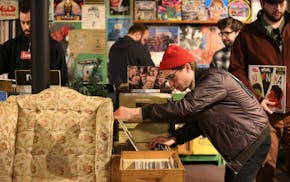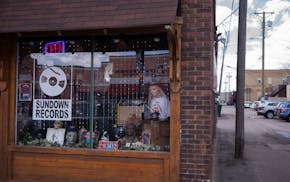If you discount Fargo-bred Jonny Lang, the last time the Minnesota State Fair hosted an all-local concert at the grandstand was in 1986 with the Jets and Limited Warranty, who risked life and wardrobe to be there (aerosol hairdos + giant frying vats = major fire hazard). That's also around the time two of the five acts performing at Friday's Minnesota Music-on-a-Stick grandstand concert were getting started. The rest were just getting to kindergarten or potty-training.
Organized by 89.3 the Current, the first all-Minnesotan grandstand show in 26 years features two distinct eras of local musicians: The '80s/'90s players in Semisonic and the Jayhawks, and the more recent stars Dessa, Jeremy Messersmith and Lucy Michelle & the Velvet Lapelles, all of whom started in the mid-'00s.
Although well acquainted -- Semisonic singer Dan Wilson even produced Messersmith's first album -- the two generations of musicians rarely perform together.
Since people often compare today's Twin Cities music scene with the heyday of the '80s and early '90s, we thought this would be a good chance to compare the state of things then and now.
RECORD LABELS Semisonic and the band that spawned it, Trip Shakespeare, signed record deals early on, as did the Jayhawks. Nowadays, neither Dessa nor Messersmith operates with label support.
Marc Perlman, Jayhawks: "Back then, albums were still all sold physically, not digitally, so you really needed a label just to handle the distribution. We loved working with [local label] Twin/Tone, but they could only do so much. We went to [Rick Rubin's] American/Def Jam label and, even though it was only a small operation, you could feel the promotional arm behind it right away."
John Munson, Semisonic: "There was a certain hipness factor about being on a label, too. But you needed them, no question, because no band ever had the money to pay for their own LP manufacturing. That was part of the hustle then."
Dessa: "At first, we [Dessa's Doomtree crew] always thought the next step to success was getting a record contract, even though we didn't know what exactly a label would do for us. I'm not going to lie and say we've had people pounding on our door, but if they were, it would take a hell of a lot to convince us to sign now."
Messersmith: "We just all have more options now. Back then, if you wanted to get your music heard, you had to sign to a record label, but nowadays you can do a lot of the work yourself. Dessa and Doomtree are a prime example of that."
RECORDINGSemisonic and the Jayhawks once spent months holed up in fancy (and expensive) studios. That, too, is no longer the story.
Munson: "I don't even want to think about how much money we blew through making those major-label records -- buttloads of it. But you had to do it. Even today, there are amazing things you can do in a home studio, but there's still something about having that one great microphone in one great-sounding room, all caught on 2-inch tape."
Perlman: "We spent about three months working in the studio on [1992's] 'Hollywood Town Hall,' and it was painstaking. But like a lot of bands when they start out, we didn't really know what we were doing in the studio."
Dessa: "Sometimes we'll do the full-blown thing at Hideaway Studio, but more often I'll just hang a blanket and hole up in my closet and do it by myself. Recording at home works well for me because I can be a little bit shy working in a studio, and because I can be very meticulous and want to rework the same line 100 times."
Messersmith: "I'd love to spend a month in a real studio. That would be one benefit of being with a record label. They'd pay for that. But I usually just pay the [cheaper] weekend rate on a studio and work on the parts where everyone in the band needs to be playing together. Then I'll work on everything else at home. A decent home-studio setup only costs about $5,000. I've done whole takes of some songs using that setup in my bedroom."
TOURINGExcept for Semisonic, they all do it. But do they make any money?
Perlman: "We started like every other band: You buy a van, sleep on floors and finance it with your day jobs. Even after we signed to Def Jam and were playing to more people, we were still logging so many miles, and it was such a grind. That was one thing we specified when we were making the deal with [last year's album] 'Mockingbird Time': We weren't going to do that kind of touring again."
Dessa: "Doomtree can do it in a 15-passenger van and make it work. We overcrowd the hotel rooms to save money. I always have to sleep with [DJ/producer] Lazerbeak. ... A lot of it depends on what goes down at the merch table. Even if I'm talking to some kid who has illegally downloaded my album and isn't buying anything, that face time alone can still be a valuable part of touring."
Messersmith: "I've done tours with my full band, but you just can't do that very often or you'll never make any money. I'm going on this supper-club tour this fall by myself, and basically I'm cutting out the usual sort of clubs and even playing some house shows. Those can be lucrative, but also if only 10 people show, it still feels a lot better than when it's only 10 people at a club [laughs]."
THE LOCAL SCENE Perlman: "Everybody was really supportive when we were starting out. The clubs supported the bands. The bands supported each other. We even knew those guys in Trip Shakespeare before we were all in bands, and we always felt a camaraderie there. Then we all hit the road and sort of lost touch with the local scene, but it seems like a lot of the same traditions carry on."
Munson: "You wouldn't see a ton of people at New Band Night, but if a little ink got spilled on a band, that was all it took for a lot of people to go check them out. I think it's been fairly consistent like that all along, though. People talk about it being a golden era now, and Jeremy and Dessa are examples of that, but then how about someone like Mason Jennings? A lot of great musicians came out between the then and now."
Messersmith: "Every time I go play in other towns, I realize how spoiled we are here. People go out to shows here, and they go out often. You don't get that in every city."
Dessa: "I think you'd be hard-pressed to find a more collaborative and supportive music scene than this one. There's good support from the journalists and the radio people, and there's this culture of young people here who seem to look at live music as an integral part of their social life."
ON EACH OTHER Perlman on Dessa: "I saw her perform, and just fell in love. She just has that certain magic as a performer. I listen to her records, too, they have a really cool, classic kind of vibe. One of the things I like about both her and Jeremy is you can tell they have a deep respect for music as an art form, and don't take it lightly."
Munson on Messersmith: "Jeremy falls into a musical realm that feels very similar to where we come from, offsprings of a lot of the same classic pop music. But he also has that sweet voice that's to die for, and he's a hell of a songwriter. His album 'The Reluctant Graveyard,' start to finish, is an absolute gem."
Dessa on Semisonic: "They had a knack for writing memorable, simple melodies -- lines that drove a song even without layers of harmonies or elaborate arrangements. That's the hardest and most important part of a musician's job: to take half a dozen notes and put them in an order that magnetizes them so people who hear them ask to hear them again and again."
Messersmith on the Jayhawks: "I was playing with Epic Hero around 2002, and one of those guys put on the Jayhawks. I distinctly remember it as the first time I heard what I considered country music and liked it. I had only heard the really bad mainstream kind of country. Since then, I've learned what great songwriters they are. That song, 'Save It for a Rainy Day,' especially. It's an honor to get to play with both them and Semisonic."
chrisr@startribune.com • 612-673-4658 • Twitter: @ChrisRstrib

What to know and seek for Record Store Day 2024 in the Twin Cities

5 vinyl shops in greater Minnesota worth a spin for Record Store Day

Review: Sibling pop band AJR put on a fun show in St. Paul, but not a good concert

